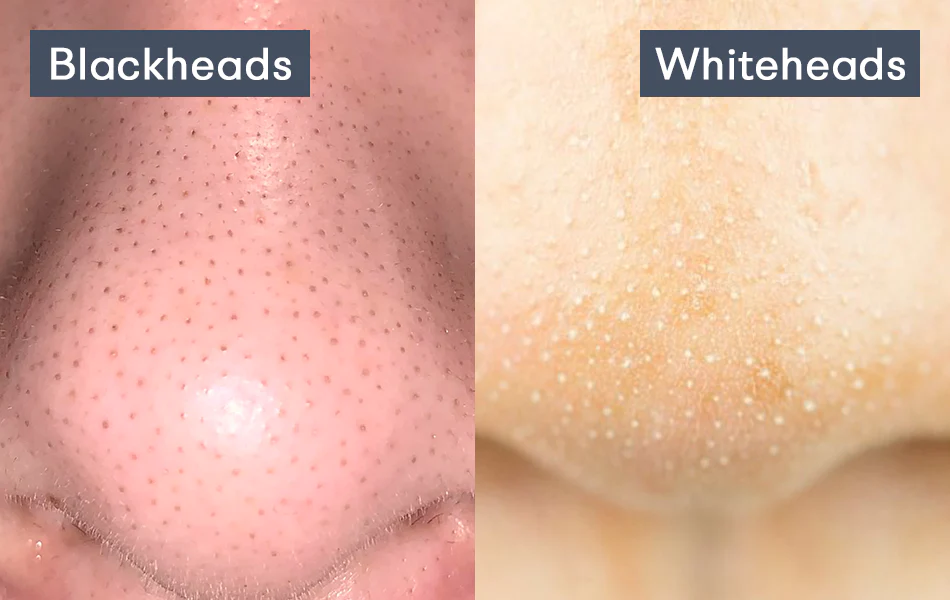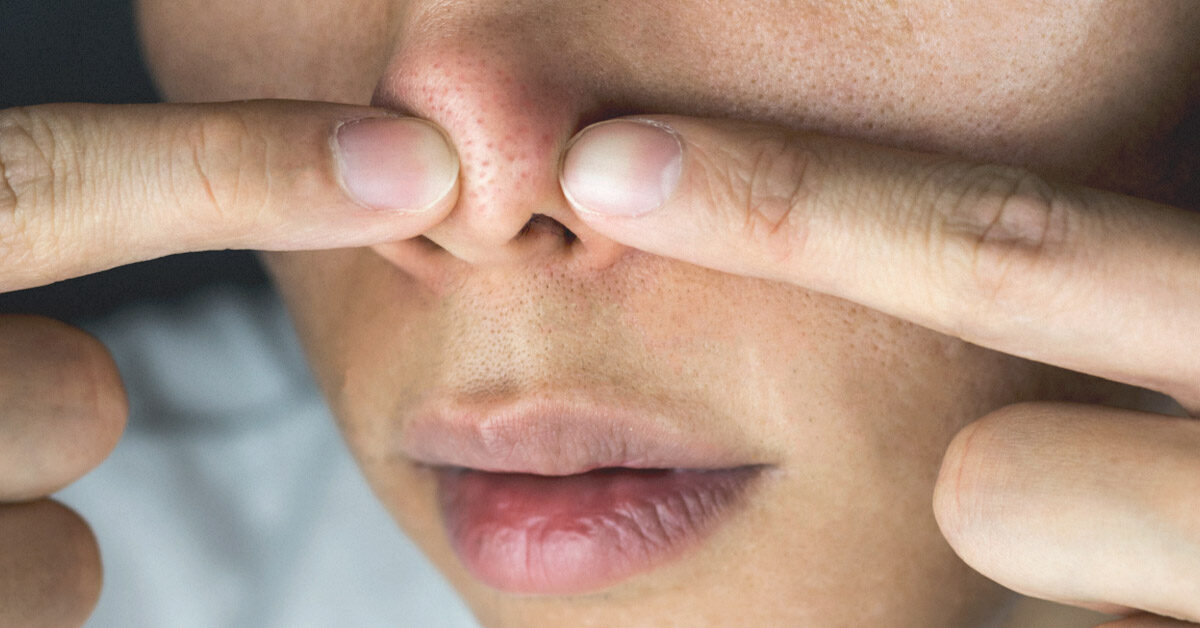Scroll till the end to find out the causes, symptoms, treatment, home remedies, and prevention to keep whiteheads at bay.
What Are Whiteheads?
Whiteheads are a type of acne that forms when dead skin cells, oil, and bacteria clog hair follicles. There are several factors that can contribute to the formation of whiteheads.

Firstly, hormonal changes can trigger the overproduction of oil in the skin, leading to clogged pores and whiteheads. Hormonal fluctuations, such as those experienced during puberty, menstrual cycles, and pregnancy, can all increase the risk of developing whiteheads.
Additionally, certain skincare and cosmetic products can also contribute to the formation of whiteheads. Products that are heavy or oily can clog pores, leading to the development. Similarly, using makeup and skincare products that contain comedogenic ingredients, such as coconut oil, can also lead to clogged pores and whiteheads.
Moreover, stress and lack of sleep can also play a role in the formation. Stress can cause the body to produce more oil, leading to clogged pores, while lack of sleep can weaken the skin’s natural defense mechanisms, making it more susceptible to whiteheads and other forms of acne.
Lastly, diet can also contribute to the development of whiteheads. Eating a diet that is high in sugar, dairy, and processed foods can increase inflammation in the body, leading to the formation of whiteheads and other forms of acne.
To prevent whiteheads, it is important to maintain a consistent skincare routine, avoid irritating and comedogenic products, manage stress, get plenty of sleep, and eat a healthy, balanced diet. If you’re experiencing frequent or severe whiteheads, it may be helpful to see a dermatologist for a proper diagnosis and personalized treatment plan.
What do Whiteheads look Like?
Whiteheads are a type of acne lesion that appears as small, round, white bumps on the skin. They are caused by clogged hair follicles, which become filled with oil, dead skin cells, and bacteria. The white appearance of the lesion is due to the buildup of oil and skin cells underneath the surface of the skin, which has not yet come into contact with the air and turned dark (as in a blackhead).
Whiteheads tend to be firm to the touch and may be accompanied by other forms of acne, such as blackheads, pimples, and cysts.
Causes Of Whiteheads
Hormonal Changes
Hormonal fluctuations, such as those experienced during puberty, menstrual cycles, and pregnancy, can increase the risk of developing whiteheads.
These hormonal changes can trigger the overproduction of oil in the skin, leading to clogged pores and whiteheads.
Skincare and Cosmetic Products
Heavy or oily products can clog pores and lead to the development of whiteheads.
Using makeup and skincare products that contain comedogenic ingredients, such as coconut oil, can also contribute to clogged pores and the formation of whiteheads.
Stress and Lack of Sleep
Stress can cause the body to produce more oil, leading to clogged pores and whiteheads.
Lack of sleep can weaken the skin’s natural defense mechanisms, making it more susceptible to whiteheads and other forms of acne.
Diet
A diet high in sugar, dairy, and processed foods can increase inflammation in the body, leading to the formation of whiteheads and other forms of acne.
Genetics
Some individuals are genetically predisposed to developing whiteheads and other forms of acne.
Environmental Factors
Exposure to harsh weather conditions, such as extreme heat and cold, can affect the skin’s oil production and contribute to the formation of whiteheads.
Poor Hygiene
Not properly cleansing the skin and removing all traces of makeup and oil can lead to clogged pores and the development of whiteheads.
Medications
Certain medications, such as corticosteroids and lithium, can increase the risk of developing whiteheads and other forms of acne.
Skin Care Mistakes That Cause Whiteheads
There are several skin care mistakes that can lead to the development of whiteheads. Some of the most common mistakes include:
Over-cleansing Or Using Harsh Cleansers
Cleansing too frequently or using products that are too harsh can strip the skin of its natural oils, leading to the overproduction of oil and clogged pores.
Not removing makeup before bed
Leaving makeup on overnight can clog pores and contribute to the formation of whiteheads.
Using products that are too heavy or oily
Products that are heavy or oily can clog pores, leading to the development of whiteheads.
Not exfoliating regularly
Dead skin cells can build up and clog pores, leading to the formation of whiteheads. Regular exfoliation can help remove dead skin cells and prevent clogged pores.
Skipping moisturizer
Skipping moisturizer can cause the skin to overproduce oil, leading to clogged pores and whiteheads.
Not using sunscreen
Sunburn and sun damage can lead to the formation of whiteheads and other forms of acne.
It is important to take a mindful approach to skincare and avoid these common mistakes in order to prevent the formation.
How To Get Rid Of Whiteheads
Here are some common treatments:
Topical retinoids:
Retinoids are a class of drugs that are derived from vitamin A and work by increasing cell turnover, which helps to unclog pores. Some topical retinoids include adapalene, tretinoin, and tazarotene. These medications can be applied directly to the affected area.
Salicylic acid:
Salicylic acid is a beta-hydroxy acid that helps to exfoliate the skin and unclog pores. It can be found in many over-the-counter acne treatments and can be applied topically.
Benzoyl peroxide:
Benzoyl peroxide works by killing the bacteria that cause acne and reducing inflammation. It is available over the counter and can be applied topically.
Chemical peels:
Chemical peels use a chemical solution to remove the outer layer of skin, which can help to unclog pores and improve the appearance. They are typically done by a dermatologist.
Extraction:
A dermatologist can manually extract whiteheads using a sterile tool. This should only be done by a professional to avoid scarring and infection.
How To Treat Whiteheads Naturally
Here are some natural remedies that can be used to treat this skin condition:
Tea tree oil:
Tea tree oil has antimicrobial properties and can help reduce inflammation. It can be applied topically to the affected area.
Honey and cinnamon mask:
Mix honey and cinnamon together to make a paste and apply it to the face. Leave it on for 10-15 minutes and then rinse off with warm water. Honey has antimicrobial properties and cinnamon helps to improve circulation.
Aloe vera:
Aloe vera has anti-inflammatory properties and can help reduce redness and inflammation associated with whiteheads. Apply fresh aloe vera gel directly to the affected area.
Green tea:
Green tea has antioxidants that can help reduce inflammation and fight bacteria. Brew green tea and apply it to the face with a cotton ball or spray bottle.
Exfoliation:
Gentle exfoliation can help remove dead skin cells and unclog pores. Try using a natural exfoliant like oatmeal or baking soda mixed with water.
Apple cider vinegar:
Apple cider vinegar has antimicrobial and anti-inflammatory properties that can help to unclog pores and reduce inflammation. Dilute apple cider vinegar with water and apply it to the face with a cotton ball.
Oatmeal and yogurt mask:
Mix ground oatmeal with yogurt to make a paste and apply it to the face. Leave it on for 10-15 minutes and then rinse off with warm water. Oatmeal has exfoliating properties and yogurt has lactic acid, which can help to unclog pores.
Baking soda:
Baking soda has exfoliating properties and can help to remove dead skin cells and unclog pores. Mix baking soda with water to make a paste and gently massage it onto the affected area. Rinse off with warm water.
Witch hazel:
Witch hazel has astringent properties that can help to remove excess oil and unclog pores. Apply witch hazel to the face with a cotton ball.
Lemon juice:
Lemon juice has antibacterial properties and can help to unclog pores. Apply fresh lemon juice to the face with a cotton ball and leave it on for 10-15 minutes before rinsing off with warm water.
It’s important to note that these home remedies may not work for everyone and it’s important to patch test before applying them to the entire face. Additionally, it’s important to maintain a consistent skincare routine and avoid touching the face with dirty hands to prevent further breakouts.
How To Prevent Whiteheads
Prevention involves maintaining good skincare habits and making some lifestyle changes. Here are some tips to help prevent this condition:
Cleanse your face twice a day:
Use a gentle, non-comedogenic cleanser to remove dirt, oil, and makeup from your skin.
Exfoliate regularly:
Regular exfoliation can help to remove dead skin cells and prevent clogged pores. However, be careful not to over-exfoliate as this can irritate the skin and cause more breakouts.
Moisturize:
Using a moisturizer can help to keep your skin hydrated and prevent it from producing excess oil.
Avoid touching your face:
Touching your face with dirty hands can transfer bacteria and oil to your skin, which can lead to breakouts.
Avoid using harsh products:
Harsh skincare products can strip your skin of its natural oils and cause it to produce more oil to compensate.
Use non-comedogenic products:
Non-comedogenic products are formulated to not clog pores and can help prevent whiteheads.
Keep hair away from your face:
Hair products can contain oils and other ingredients that can clog pores, so it’s important to keep your hair away from your face.
Practice good hygiene:
Change your pillowcases and towels regularly and avoid sharing personal items like makeup brushes.
By adopting these habits and making some lifestyle changes, you can help prevent and maintain clear, healthy skin.
Conclusion:
Whiteheads are a type of acne that occurs when pores become clogged with oil, dead skin cells, and bacteria. They appear as small, white, or flesh-colored bumps on the skin and can be treated with a variety of natural and medical remedies. Prevention measures include maintaining good skincare habits, avoiding harsh products, and keeping hair away from the face. With proper care and treatment, whiteheads can be prevented and managed effectively.
Acne vulgaris, commonly referred to as just “acne,” is a chronic skin condition characterized by the appearance of pimples, blackheads, and whiteheads. Read this post below to find out the causes, types, symptoms, treatment, prevention, and home remedies of acne vulgaris.




